When did new cars become so incredibly expensive?
It’s a question car buyers across Britain are asking themselves, as models described as ‘affordable’ options carry price tags of £40,000 or more.
But in the last year or so the tide has turned; new cars have entered the market that are more fitting of a ‘low cost’ sales pitch, sitting within the attainable £10,000 to £20,000 bracket.
And while new electric vehicles are often given flack for not being affordable, there’s a new wave of cheap EVs entering the market that cost anything from £15,000 to £25,000 – almost achieving price parity with combustion-engine rivals.
Part of the reasons is of course the influx of cheap Chinese car brands, which are pushing prices down as European marques once known for their budget vehicles fight to compete.
So, which brands these days are offering truly cheap cars? Is it just new Far East entrants or are some household names going back to their affordable roots? We take a look at five car manufacturers offering a significant number of models under the £30,000 price point.

Are cheap cars making a comeback? And which manufacturers have the most models for under £30k on sale? We take a look
Dacia – the legacy budget car brand
The Romanian brand, now owned by Renault, arrived in the UK in 2013. It found immediate success with its Sandero supermini, costing a paltry £5,995 just over a decade ago.
To put its affordability into context, it was the same price as a new Ford Fiesta in 1989.
As of January 2025, Dacia has gone onto sell 260,000 vehicles.
Why? Because it gives buyers cheap, simple cars with no thrills that are proving – so far – to be both reliable and practical.
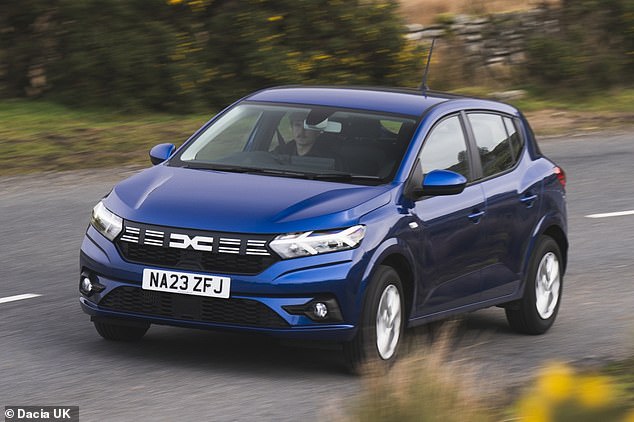
In the first half of 2024 the Dacia’s Sandero supermini was Europe’s bestselling new car. That shows how popular budget brand Dacia is with car buyers as they snap up bargain wheels
Dacia’s entire lineup today – all six models – can be bought for £22,215 and under.
The cheapest new EV in the UK is the Dacia Spring, which starts from just £14,995.
Spring has since been heralded as evidence that EVs can be brought to market at budgets accessible to almost everyone, setting a new benchmark for what constitutes a genuine budget-friendly battery model.
And Dacia has since announced another circa-£15,000 EV that’s arriving soon, increasing customers’ choice in the green car market.
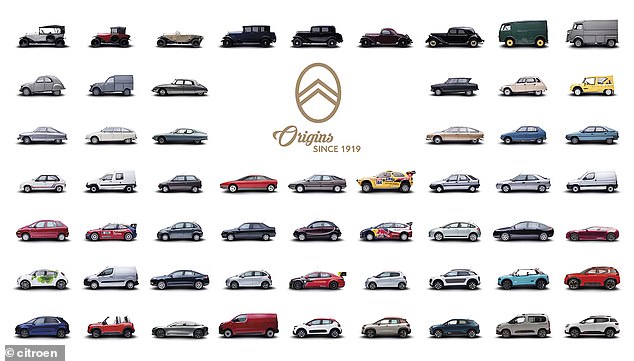
Citroen is one of the oldest car makers in the world, and has always promised innovation for an affordable price. Currently it offers five models under £30,000 – some feet in modern EV times
Citroen – comfortable cars for little cash
When Andre Citroen founded Citroen in 1919, the marketing genius immediately made it clear what the French brand was to be; a maker of cars that are comfortable, pleasurable to drive, and safe – and crucially to be delivered at an affordable price.
Today, Citroen offers five cars under the £30,000 mark, which continues to credit the foundations of the marque.
The C3 petrol is £18,305 or £22,095 for the electric version and the same for the Aircross variants, the C4 petrol is £22,595 or £27,650 for the electric, the C4 X is just £25,035 or £28,715 for the EV version, and you’ll only have to part with £28,505 for the C5 diesel/hybrid.
Then there’s the new C5 Aircross that’s just been announced and is also likely to start under £30,000.

The New Citroen C5 Aircross mid-sized SUV will come with three green powertrain options: conventional hybrid, plug-in hybrid and fully-electric and will likely cost less than £30k
Speaking about Citroen’s refreshed lineup in Paris in April, Citroen UK boss Greg Taylor said: ‘We’re never going to be the cheapest but equally, as other brands have pushed further upmarket, a white space has been created and that’s where we sit.
‘The cars look good, they’re comfortable, they have the right level of technology, and people can afford them.
‘We have five cars under 30 grand you can buy today. So, they’re not coming in six months. They’re not coming in 18 months. They’re here today.
‘No one else can say that.’
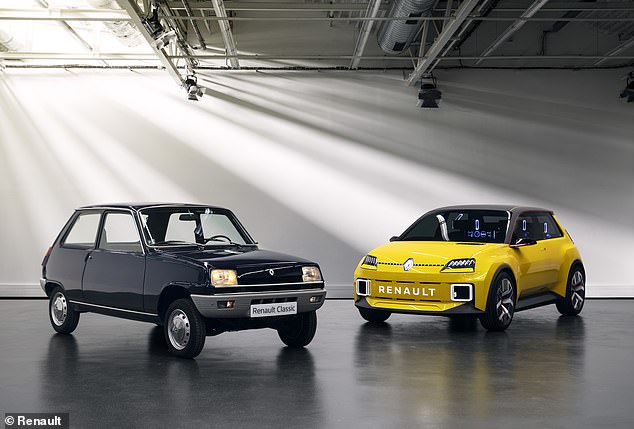
Renault is a powerhouse of French manufacturing and has seen huge success for over a century. Today it still offers buyers some retro-inspired EVs that cost as little as c.£22k
Renault – offering retro-inspired cheap EVs
Another French brand that’s on an affordability roll is Renault.
Founded in 1899, the first Renault was actually sold on Christmas Eve 1898 – the Renault Voiturette 1CV.
Just 10 years later Renault was the largest car manufacturer in France, selling around 3,500 units that year.
But it was cars like the Renault 4 and 5 that went on to sell millions in the 60s and 70s – all because Renault made utilitarian and affordable models that gave rural and urban customers practical, economical transport on wheels.
Over eight million R4s were produced worldwide and over 5.5 million R5s sold, creating an affordable legacy that is hard to beat.
Today Renault is building on that with its new electric cars in particular.
To great fanfare and critical acclaim, the new R5 and R4 EVs have arrived. Both are nods back to the cult classics but reincarnated in all-electric form – ‘super-modern retro-istic pop icons’.
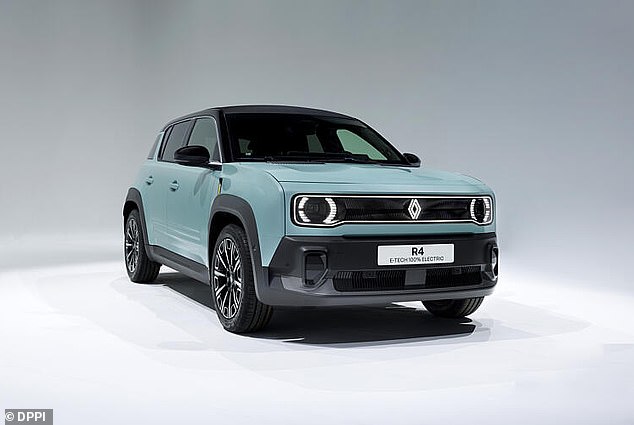
The fabled Renault 4 is back for the 21st century as a family-friendly EV that costs £27,0000
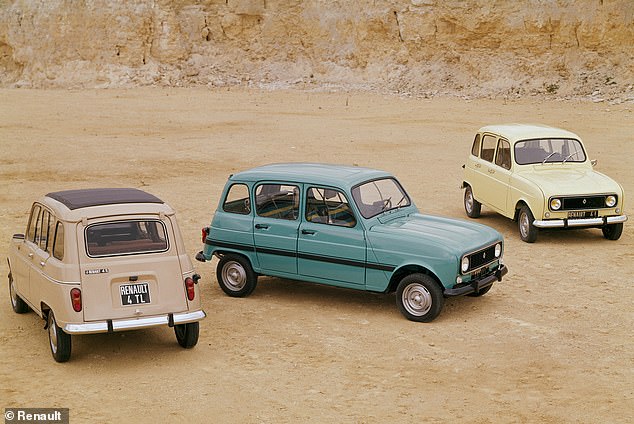
For three decades following its 1961 launch, the Renault 4 was the mainstay of the French middle classes – and over eight million were sold
The R5 e-Tech starts at just £22,995, making it one of the cheapest new EVs in the UK. The R4 EV is a bit more at £27,000, but still less than £30k.
As well as this Renault offers three other cars for under £30k: The £18,995 Clio, the £22,195 Captur and the £29,495 Symbioz.
There’s also another retro-inspired EV coming in 2026 that will be even cheaper; the circa 185-mile range Renault Twingo EV will have a price tag of only around £17,000.
If it’s anything as good as the new R4 and R5 EVs then Renault could ride a three-peak wave of retro bestselling EVs that are remarkably affordable.
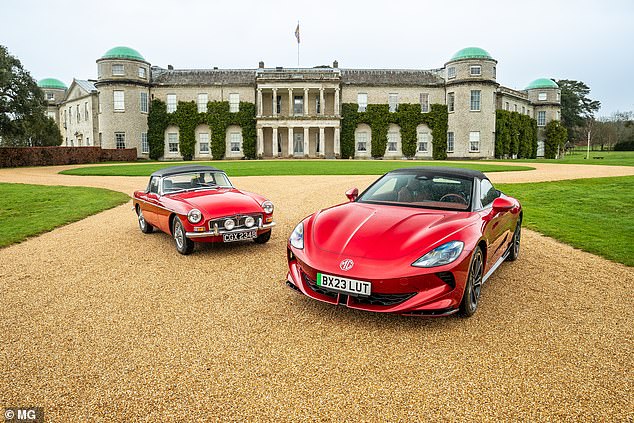
British heritage marque MG is now owned by China’s SAIC group, and it has been reinvented as an immensely popular car maker that offers bang for buck, pioneering cheap Chinese cars
MG – the former British marque that’s delivering big savings under a Chinese banner
Despite its British roots, MG is now very much a Chinese brand. And it has been a trailblazer for launching affordable cars – a move that has rewarded remarkable success in the last few years.
MG is the brand where it’s unusual if a model costs more than £30,000.
Seven out of its 10-car lineup costs less than £30k, and one of the other models is still only £31,995.
The two more expensive cars are positioned for performance, including the Cyberster hero model soft top electric roadster.
MG’s seen such success with its no-nonsense range of both combustion and electric cars that focus on practicality, safety and affordability that, as of 2024, it’s the 10th best-selling brand in the UK.
It also has a streamlined trim offering on all its cars, which does away with sneaky extra packs and offerings and makes buying simple.
The MG3 costs just £16,995, the Hybrid+ variant is £18,995, the ZS SUV is £19,995, the ZS Hybrid+ is £22,995, the HS is £25,995, the MG4 EV is £26,995 and the new S5 EV is £28,495.
But it was the MG4 that made everyone sit up and note that Chinese EVs were going to undercut European manufacturers by a significant margin while not compromising on safety, tech, quality or range, and demonstrating that price parity with combustion cars is entirely possible.
It was the second bestselling EV in the UK in 2023, only behind the Tesla Model 3.
Being at the forefront of the Chinese cheap car invasion has attributed to MG’s registrations already being up 40 per cent in 2025, and apart from Tesla it’s sold more private retail battery electric vehicles between 2019 and 2024 than any other OEM.
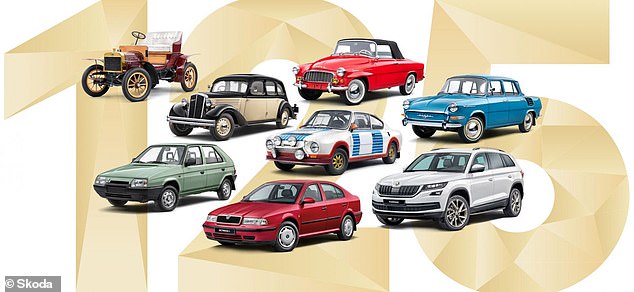
Skoda is the cheapest car brand under the Volkswagen Group umbrella, and has always delivered reliable, practical and well-honed cars for affordable prices
Skoda – sensible cars that won’t break the bank
Another brand making good on delivering affordable motors in 2025 is Skoda.
Well known for spacious, practicality and value for money motors, the Czech manufacturer was once the joke of communist car manufacturing but now is respected as a polished brand with high acclaim.
Considered the budget arm of the Volkswagen Group, Skoda currently has an offering of five cars under £30,000: the £20,515 Fabia, the Scala which is priced from £22,960, the Kamiq which starts at £24,975, the £27,610 Octavia Hatch, and the £28,590 Octavia Estate.
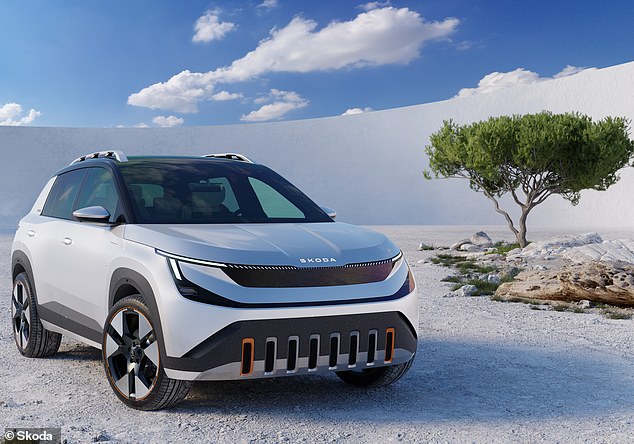
The Skoda Epiq – a city SUV crossover electric vehicle – is due to be fully unveiled in 2025. It will be the first Skoda EV to cost less than £30,000
While Skoda’s electric cars are yet to break into the sub-£30,000 bracket, the Epiq small SUV is arriving this year and is projected to start from just £23,000.
And as Skoda’s EVs are already offering long ranges and quality at competitive prices, you can expect the same from the Epiq.
Car brands that will sell some of the cheapest in the next few years – the Chinese car makers arriving soon
If you’re wondering why more Chinese car brands (direct to consumer Chinese brands not European brands owned by Chinese brands) aren’t included that’s because many of them have only just arrived in the UK or are only arriving in the next year or so.
When they have more models to offer, they’re bound to shake the current order up, so we’ve rounded up some to note.
BYD (Build Your Dreams) is perhaps the most famous new Chinese car brand in the UK, as it has taken away Tesla’s crown as the biggest EV maker in the world.
BYD arrived in 2023 and brought with it three models; the Atto 3, the Dolphin and the Seal which cost £37,705, £26,205 and £45,705 respectively. The forthcoming Atto 2 compact SUV will arrive later this year and is set to start at £30,000.
But the big news is that BYD has announced its Dolphin Surf city EV will go on sale later this year and offer ‘the best value’ in its class while costing less than £20,000.
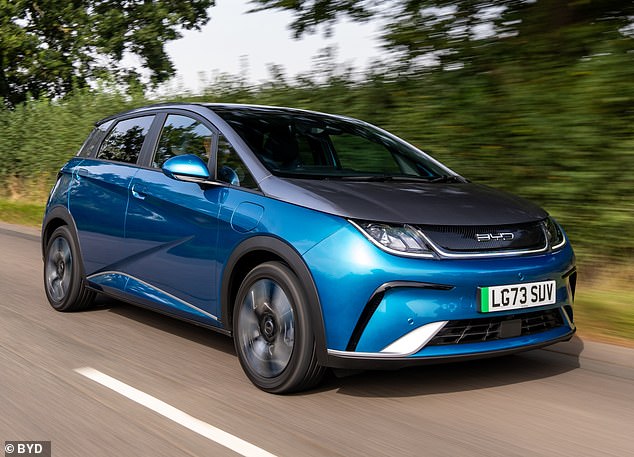
BYD has exploded worldwide, taking from Tesla as the world’s biggest EV producer. It has a number of models now available in the UK, including this Dolphin EV which starts from around £26k
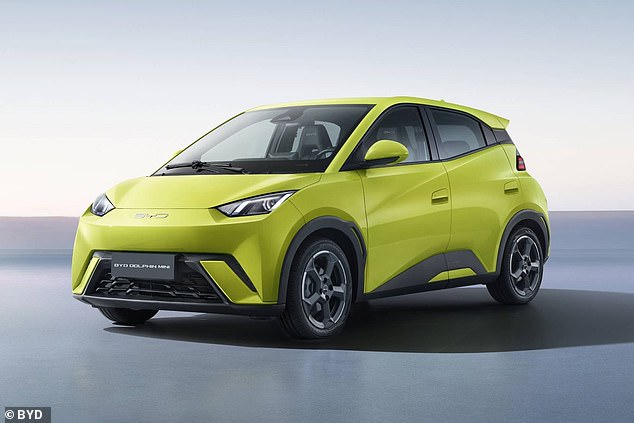
But BYD is bringing a circa £15,000 city EV to the UK market called the Dolphin Surf to compete against the Dacia Spring and Citroen e-C3 this year
Next up is Leapmotor.
Leapmotor’s current offering is the T03 city car which starts from just £16,000 – slightly more than the Dacia Spring but it is far less basic than its rival.
The C10 electric SUV and B10 SUV are arriving soon too. Stellantis is a majority stakeholder so Leapmotor’s dealership expansion will be rapid and UK-wide.
Then there’s Jaecoo and Omoda are European sister brands of Chery, the Chinese automotive giant.
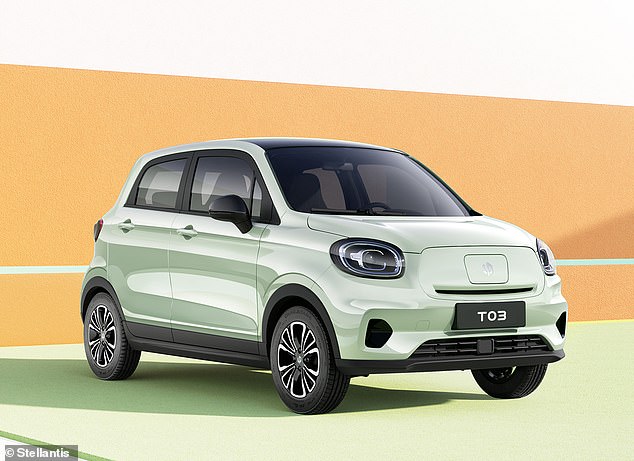
The Leapmotor T03 is around the same length as the Fiat 500. It’s set to start £16,000 – a bit more than a Dacia Spring EV but one of the cheapest you can buy in the UK
Premium brand Jaecoo’s first SUV arrived this year: The Jaecoo 7 starts from just £29,435 and goes up to £35,065 for the top-range SHS version.
The 5, a compact SUV, will follow shortly.
Omoda is aimed at younger, fashion-focused buyers and debuted with the Omoda 5.
The 5 starts from £25,915 while the electric version, the E5, is priced from £33,065.
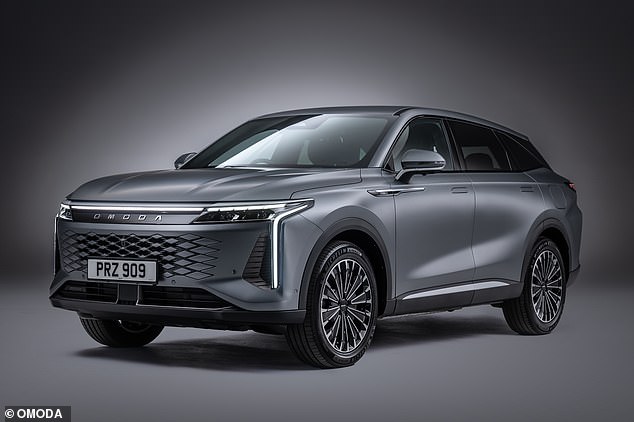
Omoda – a sub-brand of China’s largest automotive exporter Chery – has unveiled the UK spec of the Omoda 9 SHS large SUV and it’ll cost less than £45k
The Omoda 9 will be the next model arriving in the UK very shortly, a luxury SUV which will only cost £44,900 and then will be followed by the Omoda 7, the price of which is currently unconfirmed.
This is Money has recently done an ultimate guide the Chinese cars you can buy in Britain now and what they offer, as well as a deep dive into Chinese EVs and why they’re cheap. Read those for a detailed look at what Chinese cars you’ll be able to get for your money in the next few years.
How much more expensive have cars become in recent years?
Over the last decade the average list price of a new petrol car has soared from £27,035 to a depressing £45,218.
The massive 67 per cent hike in the cost of cars is significantly more than general consumer price inflation and wage growth.
Hybrid cars are also up 45 per cent – from a £30,485 average retail price to £44,273, analysts from Cox Automotive for Auto Express found using Cap HPI data.
The price hikes are across all brands.
Remember Dacia’s super cheap prices? Well even it’s seen a 28 percent rise in list prices – the highest percentage increase in fact.
This has been balanced out by its low prices to begin with, so buyers are only paying £4,197 more than nine years ago.
Mercedes expect owners to fork out £10,439 more (22 per cent) – the biggest cash rise – while a VW Golf has increased in price by £5,834 and the Ford Puma’s inflation went up by 12 per cent (£3,074).
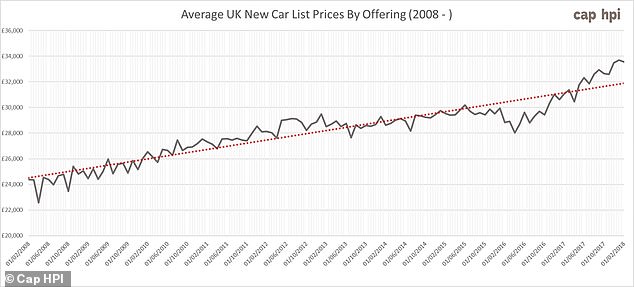
The price of new cars has ballooned over the last decade, with a 67% hike in the cost of petrol cars alone according to Cap HPI – significantly more than general consumer price inflation and wage growth
Why is this? Well there are a number of reasons.
Aside from inflation, manufacturing costs have risen, the demand for SUVs, premium features and better safety has pushed prices up, and the move to electric vehicles has prevented car makers from hitting economy targets.
Plus Covid drove manufacturers to produce more SUVs and premium models where they could make a higher profit margin as they were clobbered by supply shortages and rising costs of production.
The reasons aside, the reality is that in 1999 the average price of a new car in the UK was around £10,000.
However, there’s a move to bring those prices back down and these are some of the brands to look out for if you’re trying to get a car for as close to the kind of price tag you used to pay.













